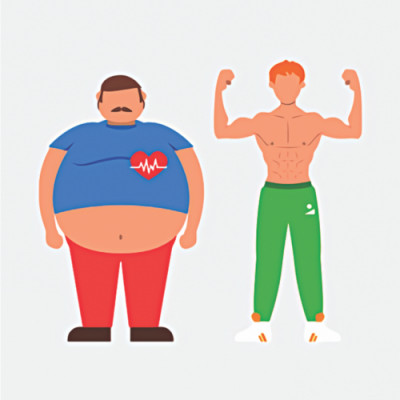Understanding Male Body Image Issues

Starting from deodorant companies to clothing brands, corporations have been able to use the power of media and has tapped into this dissatisfaction through advertising, going as far as convincing the greater society to be uncomfortable by anything that doesn’t fit the narrative of “perfect”. Eventually, its trickle-down effect has led to toxic masculinity—a cultural, masculine norm that defines what a man should be like in terms of personality, looks, behaviour etc. It is a concept that has affected the minds of the larger society like a virus and defined what a “man” should be.
A huge discussion on toxic masculinity centres around a man’s body and what it should look like which begs us to ask ourselves, what do men in our society feel about their bodies?
“I was chubby since childhood and grew overweight as I progressed to my teenage years. When I was a child, I didn’t feel bad about my body as I was always bigger in size than my peers. Over time the perspective has changed. Right now, I’m dealing with a lot of insecurities regarding my weight, like feeling conscious of how I look in clothes and a lot of self-shaming when it comes to the body I have,” says Sadid Rahman*, a student of North South University, when asked about how he felt about his body growing up.
However, body shaming in our society isn’t only restricted to those who are overweight but also affect those who are skinny. Faisal Ahmed*, an undergraduate student, contributes to this issue saying, “Since childhood, my extended family always commented on how skinny and bony I was. Weirdly enough, this didn’t affect me that much at all when I was a kid, but during my teen years, when my friends pointed it out, I did feel a bit insecure. The appearance factor was added into the mix, which wasn’t there before.”
So it appears that more often than not, male children grow up to develop insecurities when it is pointed out to them how thin or heavy particular features of their body are almost as if it were something to be concerned about compared to other individuals who have a body that better fits the norm. This leads to a toxic cycle of comparison to an ideal stereotype at the back of a person’s head where they constantly feel uncomfortable in their own skin.
Publications showing off muscular and toned figures, advertisements that feature men being surrounded and liked by women if they looked a certain way or used certain products—these narratives tap into the mentality of impressionable teens at an early age, feeding them the idea that they need to fit the image of “a perfect man”. The perfect man narrative lurks around the inherent adolescent need of being desired for and abuses it to a point of no return.
On this issue, Sadid comments, “I think the stereotype affects us on a day-to-day basis and it’s quite demotivating. Starting from getting taunted on the streets, to being glared at by people, hearing people speak and laugh in the background when you walk past them, to your relatives bringing the topic up during meals or in the most awkward of situations, it shatters your confidence because then it doesn’t matter if you’re a good student or person—it seems that your body is the only thing they notice about you and nothing else matters.”
Farhan Zaman*, professional at a renowned international corporation adds to this, saying, “I think people defining you as ‘mota’ is the issue. Mota was literally my nickname in university. Also the fact that fewer women tend to approach you hurts your confidence. As social conditioning pushes the image of a really buff guy, many women at large tend to prefer fit guys and to an extent that’s been socially accepted for ages. So little things like this creep in bit by bit and shapes the way you think about yourself.”
More often than not, the line between being healthy and shaping up to fit the image that has been painted in your head get blurry. When one aims to change the way their body looks, confusion arises; has this need for change arrived due to pent up insecurities, or is it for one’s own need to be fit?
Hasan Ahmed*, a BBA student from a private university in Dhaka recalls, “I used to work out a lot with the motivation to impress women. Sadly, it has had a negative impact on me, stemming from my irregular eating habits. I used to have diet cola drinks all day to suppress my appetite along with protein supplements and a large number of eggs. That took a toll on my health.”

Body image and self-esteem directly influence each other—and your feelings, thoughts, and behaviours. If you don’t like your body (or a part of your body), it’s hard to feel good about your whole self. The reverse is also true; if you don’t value yourself, it’s hard to notice the good things and give your body the respect it deserves.
Zamil Uddin*, working at a startup in Dhaka, shares the impact of how the traditional stereotype of a male body affected him. “Your obesity becomes your only identity. People look at you as the person who failed to control his urges, the person who is too lazy to do anything about it and the person who is just not strong enough to save oneself. That’s all I became to both who knew and didn’t know me—the guy who gave up on the gift of life,” laments Zamil.
We often talk about the dangerous effect popular culture can have on women’s body image and self-esteem. Quietly, boys and men are suffering from the same problem. Confronted with an ideal which is borderline unattainable, they are left feeling inadequate.
Sadid adds to this issue and says, “I think the situation is very similar to how women feel about supermodels. These models are hypersexualised and their bodies are toned and photoshopped and that definitely contributes to women feeling insecure when it’s the only thing being propagated as the predominant standard of beauty. I mean, basically when you see Jason Momoa’s photos and you look at your belly that’s when you get anxious about your body and you feel like you need to immediately change to that muscular body.”
The spread of body image insecurity is not just from fashion magazines and advertisements. Social media, movie industries featuring built superheroes etc. lead to men going down a spiral of constantly feeling uncomfortable in their own bodies.
“Social media shows us all these folks hitting the gym, losing weight, getting ripped. You’d think it’d inspire me, but most times it makes me want to hide in a corner,” says Ziaus Rahman*, a recent graduate. “It’s normal for people to feel a bit self-conscious about their appearance from time to time and it’s normal to have a few small things you’d like to change about your appearance if you could. However, feeling obsessed with your appearance or if their concerns about your appearance begin to interfere with your daily lives, you should seek help. For instance, I used to refuse to participate in social gatherings because I worried about my weight and people commenting on me. When this was pointed out to me that’s when I decided to seek help for this issue.”

When asked if an ideal body image should exist, Sadid responded, “I think my perspective of an ideal body image should be one where you’re just perfectly healthy in mind and body. I think being overweight or obese is not good and it’s purely because of health reasons and it should be one where just people aren’t really thin where they become anorexic and end up hurting themselves or people shouldn’t be very overweight where it could lead to heart problems.”
Zamil added, “Your weight should never be a measure of your self-worth. You can love yourself while still wanting to change yourself. You do not have to lose weight to be valuable. Lose weight because you want to run faster, jump higher and live your life to the fullest, not because you think your value is reflected by the number on a scale.”
*Names have been changed to protect the privacy of the individuals
Nazifa Raidah is an undergraduate student from Independent University, Bangladesh majoring in media and communications. Reach her at nazifa0419@gmail.com


 For all latest news, follow The Daily Star's Google News channel.
For all latest news, follow The Daily Star's Google News channel. 



Comments